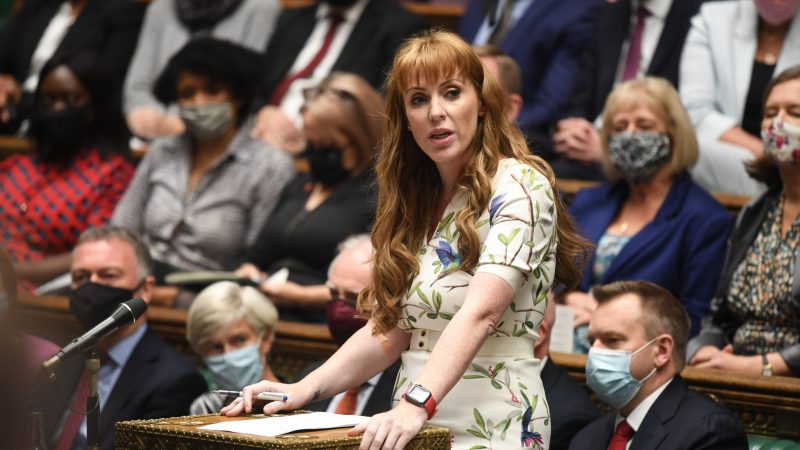
Angela Rayner has argued that the government is “in chaos” and warned MPs that “the country is paying the price” as she criticised Boris Johnson over his decision to appoint Steve Barclay as his Downing Street chief of staff.
In an urgent question tabled in parliament this afternoon, the deputy Labour leader called on Barclay to make a statement on his appointment as part of the No 10 team. He is currently already serving as an MP, the minister in charge of the Cabinet Office and Chancellor of the Duchy of Lancaster.
Barclay did not attend parliament but sent paymaster general Michael Ellis to respond in his place. Rayner told MPs: “His very first act, Mr Speaker, is refusing even to turn up here to explain his own job.
“But maybe the paymaster general can tell us is it a ministerial job, a public appointment, a party role? It’s not a [special adviser], is it something that doesn’t even exist yet? Apparently, he won’t get a salary, Mr Speaker. Perhaps he should join a trade union.”
She asked whether Barclay would appoint or manage advisers or officials, how his role will relate to the permanent secretary and whether he would lead a new department as chief of staff or whether it will “merge” with the Cabinet Office.
Rayner asked the minister: “Is [Barclay] still in charge of dealing with the Channel crossings, tackling the pandemic, protecting the union, veterans policy and every other priority of the Cabinet Office?”
Ellis, answering for the government this afternoon, reminded Rayner that the position was created by Tony Blair for unelected holders such as Alistair Campbell, and said Barclay would continue to be accountable to parliament as Chancellor of the Duchy of Lancaster.
Johnson appointed Barclay over the weekend, following a number of resignations from Downing Street on Friday prompted by the ‘partygate’ scandal. Concerns have been raised as to whether the MP will have enough time to devote to his new role.
According to Erskine May, the rulebook for parliamentary procedure, “all persons employed either in whole or in part in the civil service are disqualified” from becoming an MP. The minister rejected that the chief of staff is a civil servant.
Several high-level members of Johnson’s Downing Street team resigned their posts last week including policy chief Munira Mirza, who had worked with the Prime Minister for 14 years. She cited the Prime Minister’s accusation that Keir Starmer failed to prosecute Jimmy Savile as the reason for her departure.
Among others, chief of staff Dan Rosenfield and private secretary Martin Reynolds – who sent the email inviting staffers to attend a Covid rule-breaking ‘BYOB’ party during the pandemic – also announced they were leaving on Friday.
Downing Street has insisted that the resignations are all part a plan for a reset after the Prime Minister said, early last week in response to the publication of the Sue Gray report, that he would make changes to how No 10 functions.
Guto Harri, also appointed over the weekend as director of communications, described Johnson as “not a complete clown” in an interview shortly after taking up his new position, adding that he is a “very likeable character”.
He also revealed that, when asking Harri on Friday to take the position, the Prime Minister assured him that “I will survive” by singing lines from the Gloria Gaynor song. Johnson has been under increasing pressure from his party in recent weeks.
Around 15 Tory MPs are thought to have submitted letters of no confidence following numerous revelations that rule-breaking social gatherings took place in Downing Street and elsewhere in Whitehall offices during Covid lockdowns.
Harri previously worked for Johnson as his spokesman and chief of staff during his first term as London mayor. Labour has raised concerns over Harri’s work as a lobbyist on behalf of Huawei, calling for transparency over “all contact he had with government in his former role and who his clients were”.
Commenting on the new hires, Starmer said earlier today: “We’ve been here before. This time last year we were told that the Prime Minister had learnt the lessons, he was putting a new team in place. Only a few weeks ago we were told he was going to make changes and this was going to be what would make the difference.”
The Labour leader added: “Nothing will change until the person at the top changes, because all routes really lead to the Prime Minister and that’s the change that we really need to see now.”




More from LabourList
Tom Belger column: ‘Why is Labour making migrant exploitation easier?’
Ashley Dalton resigns as health minister for cancer treatment
Paul Nowak column: ‘Labour must focus on the basics’